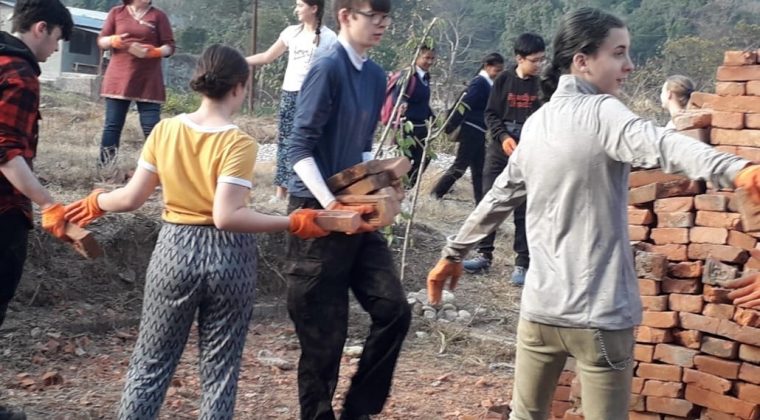
Transition Year in John Scottus School is viewed as an important bridge in the passage from adolescence into adulthood. We encourage our young people to take a stand and pick up the challenge of creating a world of their own. They are acknowledged as partners in shaping the year and expected to use their own energies in making this year work for them. They can ask for advice as they need it, and they are treated with respect as an adult would expect to be.
During John Scottus School Transition Year, we aim to help students become aware of their inner potential and chief talents, and to provide them with vision, so they can help make the world a better place for themselves and those around them.
Development Education
Our Development Education Project in Nepal and formerly in India forms a major part of Transition year.
Each year since 2002 our Transition Year students have raised funds to travel to India and Nepal and work with local communities in helping them develop education for their children. The students of Transition Year have helped build schools from scratch, plus extensions and classrooms onto others, all in severely disadvantaged areas.
These projects have resulted in thousands more children attending school and bridges have been built between our students and local communities all over the state.
Please see below a video clip created by students who went on the Nepal Trip in 2020.
A student has created this documentary video about the Indreni project which the Transition Year Students are currently helping out with.
Please see below a video highlighting the work by students in India.
Transition Year Drama
A key ingredient in the success of the year in terms of the confidence it instils in students is the public performance of a Shakespeare play. We have a proud tradition of putting everyone on stage. Drama is highly important in Transition Year and the play is the ultimate group-learning experience creating for students a memorable and life enhancing milestone. Productions have included Othello, Hamlet, King Lear, Comedy of Errors , A Midsummer Night’s Dream, Twelfth Night, As You Like It, The Tempest , Much Ado About Nothing , Romeo & Juliet and The Merchant of Venice in Players Theatre, Trinity College Dublin.
Transition Year Learning
Challenge-Based Learning
Challenge-based learning is a student-centred instructional strategy in which pupils collectively solve problems and reflect on their experiences. Learning is driven by challenging, open-ended problems. Students work in small collaborative groups.
Teachers take on the role as “facilitators” of learning. Students are encouraged to take responsibility for their group and organize and direct the learning process with support from the teacher. We believe this method enhances content knowledge and fosters the development of reason, communication, problem-solving, and individual self-directed learning skills.
Development of Reason
Using the challenges many topics, ideas and activities are introduced into Transition Year that do not get sufficient time in the normal curriculum of the secondary school. The intelligent use of reason is enhanced through meditation, pausing between activities and the study of philosophy. These are all instrumental to the educational process in John Scottus Transition Year.
We train students in the use of higher-order skills. These include leadership skills, critical analysis, team work, individual learning skills, public speaking, personal development, problem solving, decision making and community service.
Projects and Learning Activities
Some of the projects and learning activities in the TY program include
- Working with the Enneagram.
- Gaisce and community Service
- Genealogy and family history
- ICT and Scratch
- Media and Rapping
- Zoology
- Teaching English as a foreign language
- Cookery course
- Neuroscience and the brain
- Plato, Vedanta and Comparative religion
- Food and well-being: Conscious consumption
- Microbiology and the spread of disease
Parental Involvement
It is important that home, school and society hold the same point of view. This is vital in the creation of a unified person. Parents are asked to play their full part in helping students, by keeping in touch and supporting the events of the year. A young person is supported by a whole team and it is vital that the team has clear goals which support this growth and development.
Assessment
We use self-, peer- and teacher-assessment as a way of helping students to improve their learning and outputs. This enables students to view learning as a continuous process rather than a set of one-off exams and assignments. This is in line with ‘Assessment For Learning’ techniques rather than assessment of learning. Comments and critiques allow students understand where they have succeeded and where they can further improve and is more meaningful than a simple grade. This will be the method used to report to parents throughout this coming year.
